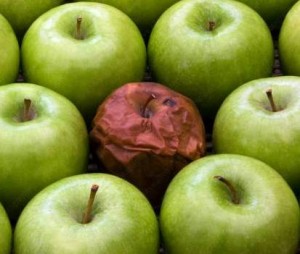You’ve all hard the expression “one bad apple can spoil the whole bund” be applied to a group of people with one member who is a bad influence. The fear is that the one person who is the poor example will have a negative effect on the other people they associate with. This saying came from some sort of truth; a scientific truth. I began to wonder if you put an actual rotten apple in a bowl of fresh ones, would the spoiled apple quickly ruin the fresh apples?
Turns out this is a scientific truth that when one rotten apple is exposed to ones that are not it will cause the fruit to ripen faster and eventually rot. This is because as apples ripen they give off a hormone in a gaseous from called ethylene which is a catalyst for ripening fruit. When a well ripened fruit is in close vicinity with other fruits the gas is absorbed into the other fruits causing them to ripen. Logically the riper a piece of fruit the more ripening gas it is going to produce and a rotten piece of fruit is going to produce a whole lot more of that ethylene gas. If you have a piece of fruit that is not ripe at all putting it in a sealed bag with a piece of ripe fruit with quicken the process; the ethylene gas is trapped in a more confined area and it delivered in larger concentrations to the fruit in the container.
Most recently scientists have been working on a delayed ripening technology so that fruits and vegetables have a longer self life at super markets before they got rotten. Once a fruit or vegetable begin the ripening process it is irreversible. Thus scientists are trying to prevent the process from starting altogether. Typically former pick and ship their produce while they are still unripe and once they produce reaches the destination they are sprayed the the ripening inducing hormone ethylene. There are drawbacks to this approach however because fruits that have been harvested prematurely may result in poor taste and quality and fruits transported for long periods under refrigeration also have the tendency to lose their quality (ISAAA).
To prevent the poor quality of this fruit scientists have discovered they can suppress certain genes in the fruit or insert certain genes to delay the ripening process. The scientists can insert genes that reduce the amount of hormones available for ethylene production which slows the process of suppress genes that are needed in the final stages of biosynthesis in producing ethylene for ripening. This use if the genetically modifying process has been approved in the US and has been label safe for consumption. With this technology farmers can now wait until their crops are matured to pick them from the vine and extends the shelf life as well.
However these products are considered to be genetically modified and GMOs have been getting a lot of bad press recently because there are still being studies conducted to find out how exactly they affect human health. Much like the process of discovering smoking caused lung cancer and was bad for humans, the scientific world is undergoing to process of determining whether or not GMOs have an adverse effect on the human body and if they do the what degree. A trial was done on rats examining the effects of GMOs. some rate were fed a genetically modified potato while others were fed one that had not been modified. There were noticeable differences in the digestion of the modified potato. However this study was criticized because the potatoes were modified with a substance known to be toxic to mammals; however the scientists of the rat study claim they were only testing the methodology of GMOs. In order for the study go genetically modified foods to go further scientists must start using chemical which are actually used in foods available for sale in the US. I thought this was a good example of how scientific studies are always susceptible to scrutiny as a method of further growth and envelopment for the good of human kind.
Resources
http://mentalfloss.com/article/31666/does-one-bad-apple-really-spoil-whole-bunch
http://www.isaaa.org/resources/publications/pocketk/12/default.asp
http://www.csa.com/discoveryguides/gmfood/overview.php#n34

